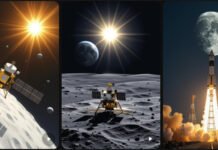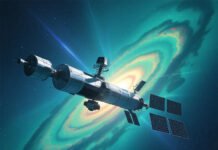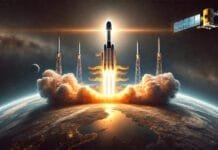INVC NEWS New Delhi — India is poised to break new ground in space exploration by launching unprecedented biological experiments on the International Space Station (ISS) aimed at studying the potential for human life to thrive beyond Earth. This bold initiative, a first of its kind globally, represents India’s relentless pursuit of scientific innovation and space technology excellence.
Axiom-4 Mission: A Collaborative Leap for Space Biology
Under the ambitious Axiom-4 mission, the Indian Space Research Organisation (ISRO), in partnership with the Department of Biotechnology (DBT) and NASA, will conduct detailed experiments to understand how biological systems respond and adapt to the microgravity environment of space. Indian Air Force Group Captain Shubhanshu Shukla, set to become the first Indian to visit the ISS since Rakesh Sharma’s historic 1984 mission, will play a pivotal role in these experiments.
Studying Algae Growth and Genetic Changes in Microgravity
The core of these experiments focuses on microalgae species, with scientists analyzing how these organisms grow differently in space compared to Earth. Particular attention will be given to three edible microalgae species, assessing their growth parameters and genetic activity under space conditions. Understanding which microalgae thrive in microgravity is crucial for developing sustainable food sources for long-duration space missions.
Exploring Cyanobacteria for Reliable Space Nutrition
Another significant experiment aims to examine the growth and reaction of cyanobacteria like Spirulina and Cyanococcus in space. By using urea and nitrate-based nutrient mediums, researchers hope to identify reliable and nutrient-rich food sources for astronauts, essential for maintaining health during extended stays in space. This research could revolutionize how space missions are supplied with food.
Muscle Health Research in Zero Gravity
Addressing a critical challenge of space travel, the mission will also investigate the effects of microgravity on human muscles. Muscle atrophy in space is a known risk, and studying these changes will help develop countermeasures to keep astronauts fit and healthy during long-term missions.
Shubhanshu Shukla’s Journey to the ISS on June 8
Scheduled to launch on June 8 from NASA’s Kennedy Space Center in Florida aboard SpaceX’s Dragon spacecraft, Group Captain Shubhanshu Shukla will join astronauts from the United States, Hungary, and Poland for a 14-day mission aboard the ISS. His journey marks a new chapter in India’s space saga, taking over three decades after Rakesh Sharma’s pioneering voyage.
Innovative Experiments with Traditional Indian Foods
Among the seven experiments slated for this mission, some will test the germination of traditional Indian food items like fenugreek and moong in space, adding a unique dimension to the research on sustainable space agriculture and nutrition.
India’s entry into this cutting-edge domain of space biology signals a transformative leap, positioning the nation as a formidable player in global space exploration and human spaceflight research. The findings from this mission could pave the way for humanity’s future in off-world habitats and long-duration space travel.
















